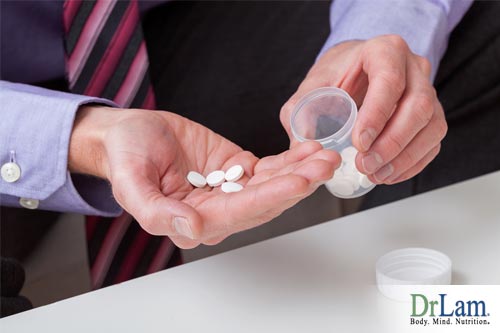
 Depression is a common symptom of Adrenal Fatigue. Many people with with both depression and Adrenal Fatigue are given antidepressants to cope. This article goes in depth about depression and Adrenal Fatigue. It will help you understand what to expect if you suffer from depression and Adrenal Fatigue, and how you might best control the related symptoms.
Depression is a common symptom of Adrenal Fatigue. Many people with with both depression and Adrenal Fatigue are given antidepressants to cope. This article goes in depth about depression and Adrenal Fatigue. It will help you understand what to expect if you suffer from depression and Adrenal Fatigue, and how you might best control the related symptoms.
It is normal to feel sad or lifeless at different points in your life, especially after experiencing a disappointment or stressful event. This is not depression. Depression is when a feeling of emptiness and despair sinks into a person's life and they can't seem to find relief. Depression is never a pleasant thing to experience.
It often goes along with fatigue, feeling overwhelmed, disinterest, and a general sense of hopelessness. Sometimes depression even manifests as feelings of anger and restlessness. There are different types and levels of depression. Some are more extreme and serious than others. Depression can be a sign of physical, psychological, or mental disorder. However, it can also exist as a singular issue.
It is very important to determine the cause of depression and determine the best way to overcome it. You don’t want to live your life feeling depressed and unhappy with no foreseeable end in sight. There are lifestyle changes you can make to help you cope with depression. Healthy eating, regular exercise, reducing stress, and restful sleep, are just a few small changes you can make that can have a huge impact. There is also a range of different alternative medicines, which may help a person to overcome depression. However, it is always a good idea to see a medical professional for help, especially if the depression becomes too overwhelming and makes it difficult to function daily.
Depression is thought to arise when the body’s neuroaffective system becomes irregular. There is a tight balance between the central nervous system, autonomic nervous system, and gastrointestinal system that serves to help regulate neurotransmitters in your body and thus your mood. Neurotransmitters such as serotonin, dopamine, and norepinephrine become irregular, and this imbalance results in a depressive state of mind. More recently, inflammation is increasingly being seen as a major component to depression. One study has shown that proinflammatory molecules such as IL-6 and TNF-alpha were found in higher levels in people with depression.
When you go to a medical doctor you will take a series of tests to determine if your depression is linked to a physical condition. The doctor will generally do a full medical workup, checking for thyroid issues, anemia, and other common problems. After this s/he might suggest certain medications that are designed to give the body energy and stimulation.
Some frequent medical solutions include bioidentical hormone replacement and thyroid replacement. Other hormones like testosterone may also be involved. If these various medical solutions do not work and the depression and/or fatigue persist, many doctors turn to antidepressants.
 Antidepressants such as selective serotonin reuptake inhibitors, SSRIs, act by increasing the serotonin available in your brain’s neurosynaptic clefts. It has also been found to lower inflammation in the brain. This further strengthens the belief that inflammation is indeed related to depression.
Antidepressants such as selective serotonin reuptake inhibitors, SSRIs, act by increasing the serotonin available in your brain’s neurosynaptic clefts. It has also been found to lower inflammation in the brain. This further strengthens the belief that inflammation is indeed related to depression.
It is very common for you to experience low vitality as well as a low energy states if you suffer from Adrenal Fatigue. Sometimes antidepressants will solve this problem and give you more energy, but often times they don't. This is because the root problem is not being addressed. This, in turn, leads to people becoming discouraged and frustrated as time progresses.
When traditional medical solutions don't work, a lot of problems can develop. Sleeping often becomes an issue, the body slows down, GI disturbances increase, brain fog increases, and appetite also becomes a problem. There are a number of other issues, which also arise or can become worse.
After you have complained enough to your doctor, it is likely that s/he will take some form of action. At this point you are likely given antidepressants and/or sleeping pills. You might wonder whether or not antidepressants are a good idea or the right choice.
It is important to listen to your physician, and might be wise to take antidepressants, especially if depression is a big problem alongside Adrenal Fatigue. Depression is not something to leave neglected and unresolved. The primary issue here is that a lot of individuals who do take antidepressants don't experience any kind of improvement. They still experience low energy levels and fatigue, even with the presence of anti-depressant medication.
Generally antidepressants help individuals sleep because they help the body slow down. This is one common side effect experienced by people with Adrenal Fatigue, and it may be improved with medication. However, depression is another large problem, and generally antidepressants do not help this issue. It is very important to ask why this is the case.
If a patient, or their doctor, doesn't ask this question then the next step is usually just to get a stronger dose of antidepressant. Sometimes this is the right course of action, and a stronger dose does help the problem. However, even when the same symptoms persist, most medical doctors choose to continue on in the same direction, with increasing medication, in order to resolve the issue.
 If you have a cognitive impairment or a neurotransmitter problem and are suffering from depression as a result of those issues then an antidepressant will be more useful. If, on the other hand, your depression is associated with a strong adrenal element, then the antidepressant likely won't do the job and the patient might even feel worse.
If you have a cognitive impairment or a neurotransmitter problem and are suffering from depression as a result of those issues then an antidepressant will be more useful. If, on the other hand, your depression is associated with a strong adrenal element, then the antidepressant likely won't do the job and the patient might even feel worse.
When it comes down to Adrenal Fatigue one of the key indicators and symptoms, which can alert a person to the real problem, is the ineffectiveness of antidepressants. If this sounds like something you are going through, it could definitely be a signal that Adrenal Fatigue may be the primary problem at hand.
Natural alternatives to help lower inflammation and subsequently help you fight depression and Adrenal Fatigue include omega-3 fatty acids, tumeric, probiotics, and digestive enzymes.
Depression is a serious medical disorder that can severely impact your quality of life and even your life itself. So, it's important that you reach out for help if you believe that you may suffer from this condition. This is even more important because of the link between depression and adrenal fatigue, because both of these conditions will feed off each other and worsen the entire experience. Here's what to do if you believe you're depressed or if someone else comments on your ongoing low mood:
For depression or any other disorder relating to adrenal fatigue, get expert help and support from our team by clicking here or giving us a call on +1 (626) 571-1234.
© Copyright 2016-2020 Michael Lam, M.D. All Rights Reserved.
